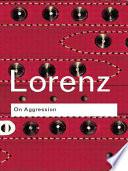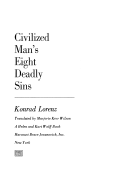Works

On Aggression
Konrad Lorenz
Civilized Man's Eight Deadly Sins
Konrad LorenzFamous Konrad Lorenz Quotes
Source: Lads Before the Wind: Diary of a Dolphin Trainer
Civilized Man's Eight Deadly Sins (1973)
Source: On Aggression (1963), Ch. XII : On the Virtue of Scientific Humility
Konrad Lorenz Quotes about nature
Ch. XII : On the Virtue of Scientific Humility http://www.marxists.org/reference/subject/philosophy/works/ge/lorenz.htm
On Aggression (1963)
Source: On Aggression (1963), Ch. XII : On the Virtue of Scientific Humility
Source: On Aggression (1963), Ch. XII : On the Virtue of Scientific Humility
Konrad Lorenz Quotes
Source: On Aggression (1963), Ch. XII : On the Virtue of Scientific Humility
Context: We are the highest achievement reached so far by the great constructors of evolution. We are their "latest" but certainly not their last word. The scientist must not regard anything as absolute, not even the laws of pure reason. He must remain aware of the great fact, discovered by Heraclitus, that nothing whatever really remains the same even for one moment, but that everything is perpetually changing. To regard man, the most ephemeral and rapidly evolving of all species, as the final and unsurpassable achievement of creation, especially at his present-day particularly dangerous and disagreeable stage of development, is certainly the most arrogant and dangerous of all untenable doctrines. If I thought of man as the final image of God, I should not know what to think of God. But when I consider that our ancestors, at a time fairly recent in relation to the earth's history, were perfectly ordinary apes, closely related to chimpanzees, I see a glimmer of hope. It does not require very great optimism to assume that from us human beings something better and higher may evolve. Far from seeing in man the irrevocable and unsurpassable image of God, I assert – more modestly and, I believe, in greater awe of the Creation and its infinite possibilities – that the long-sought missing link between animals and the really humane being is ourselves!
Source: On Aggression (1963), Ch. XII : On the Virtue of Scientific Humility
Context: Nobody can seriously believe that free will means that it is left entirely to the will of the individual, as to an irresponsible tyrant, to do or not do whatever he pleases. Our freest will underlies strict moral laws, and one of the reasons for our longing for freedom is to prevent our obeying other laws than these. It is significant that the anguished feeling of not being free is never evoked by the realisation that our behaviour is just as firmly bound to moral laws as physiological processes are to physical ones. We are all agreed that the greatest and most precious freedom of man is identical with the moral laws within him. Increasing knowledge of the natural causes of his own behaviour can certainly increase a man's faculties and enable him to put his free will into action, but it can never diminish his will. If, in the impossible case of an utopian complete and ultimate success of causal analysis, man should ever achieve complete insight into the causality of earthly phenomena, including the workings of his own organism, he would not cease to have a will but it would be in perfect harmony with the incontrovertible lawfulness of the universe, the Weltvernunft of the Logos. This idea is foreign only to our present-day western thought; it was quite familiar to ancient Indian philosophy and to the mystics of the middle ages.
Source: On Aggression (1963), Ch. XII : On the Virtue of Scientific Humility
Context: We are the highest achievement reached so far by the great constructors of evolution. We are their "latest" but certainly not their last word. The scientist must not regard anything as absolute, not even the laws of pure reason. He must remain aware of the great fact, discovered by Heraclitus, that nothing whatever really remains the same even for one moment, but that everything is perpetually changing. To regard man, the most ephemeral and rapidly evolving of all species, as the final and unsurpassable achievement of creation, especially at his present-day particularly dangerous and disagreeable stage of development, is certainly the most arrogant and dangerous of all untenable doctrines. If I thought of man as the final image of God, I should not know what to think of God. But when I consider that our ancestors, at a time fairly recent in relation to the earth's history, were perfectly ordinary apes, closely related to chimpanzees, I see a glimmer of hope. It does not require very great optimism to assume that from us human beings something better and higher may evolve. Far from seeing in man the irrevocable and unsurpassable image of God, I assert – more modestly and, I believe, in greater awe of the Creation and its infinite possibilities – that the long-sought missing link between animals and the really humane being is ourselves!
Source: On Aggression (1963), Ch. XII : On the Virtue of Scientific Humility
Context: We are the highest achievement reached so far by the great constructors of evolution. We are their "latest" but certainly not their last word. The scientist must not regard anything as absolute, not even the laws of pure reason. He must remain aware of the great fact, discovered by Heraclitus, that nothing whatever really remains the same even for one moment, but that everything is perpetually changing. To regard man, the most ephemeral and rapidly evolving of all species, as the final and unsurpassable achievement of creation, especially at his present-day particularly dangerous and disagreeable stage of development, is certainly the most arrogant and dangerous of all untenable doctrines. If I thought of man as the final image of God, I should not know what to think of God. But when I consider that our ancestors, at a time fairly recent in relation to the earth's history, were perfectly ordinary apes, closely related to chimpanzees, I see a glimmer of hope. It does not require very great optimism to assume that from us human beings something better and higher may evolve. Far from seeing in man the irrevocable and unsurpassable image of God, I assert – more modestly and, I believe, in greater awe of the Creation and its infinite possibilities – that the long-sought missing link between animals and the really humane being is ourselves!
pp 45-47
Civilized Man's Eight Deadly Sins (1973)
Context: The competition between human beings destroys with cold and diabolic brutality.... Under the pressure of this competitive fury we have not only forgotten what is useful to humanity as a whole, but even that which is good and advantageous to the individual.... One asks, which is more damaging to modern humanity: the thirst for money or consuming haste... in either case, fear plays a very important role: the fear of being overtaken by one's competitors, the fear of becoming poor, the fear of making wrong decisions or the fear of not being up to snuff.
Source: On Aggression (1963), Ch. XII : On the Virtue of Scientific Humility
Source: On Aggression (1963), Ch. XIII : Ecce Homo!
Trans. M. Latzke (1966), p. 8
On Aggression (1963)
